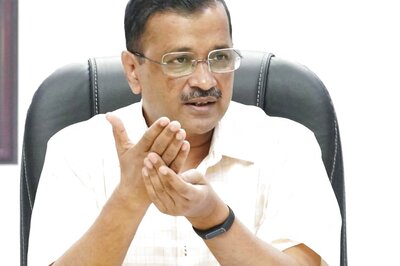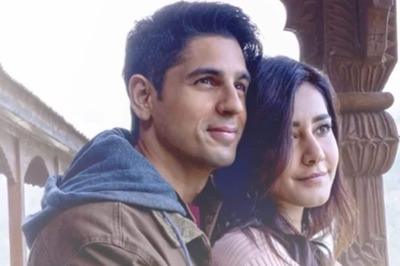
views
New Delhi: As Mamata Banerjee continues her sit-in protest at Dharmatala, Centre versus State tussle has reached a new high with the West Bengal chief minister alleging forceful intrusion of the CBI within the state jurisdiction.
But why has the chief minister of a state turned up in defence of a police officer? Can the CBI investigate a court-monitored probe if the general consent by the state is withdrawn? News18 esxplains:
Why has Mamata Banerjee launched a sit-in protest?
Banerjee, who began a sit-in protest over the CBI's attempt to question the Kolkata Police chief in connection with chit fund scams, says she will continue her "satyagraha" till the country and its constitution are "saved". The chief minister skipped meals and remained awake the entire night on a makeshift dais, along with some senior ministers and party members.
The fast-paced development started unfolding as soon as a team of 40-odd agency officers arrived at Kolkata Police Commissioner Rajeev Kumar's residence at Loudon Street in central Kolkata on Sunday afternoon, but were stopped by sentries and officials. The team had gone to question Kumar in connection with chit fund scam cases. As the CBI team landed at his residence, a team of Kolkata police officers rushed to the spot to speak to the CBI officials and tried to enquire if they had the documents required for questioning Kumar.
Who is Rajeev Kumar and does CBI want to investigate him?
Rajeev Kumar is the current commissioner of Kolkata Police. He is a 1989-batch IPS officer of West Bengal. He was appointed as the Commissioner of Kolkata Police in 2016, replacing Surajit Kar Purakayastha. Purakayastha was promoted to CID.
Before being appointed as Kolkata Police Commissioner, Kumar had worked as Commissioner of Police, Bidhannagar Police Commissionerate, and as Special Task Force (STF) chief under Kolkata Police.
Kumar was heading the Special Investigation Team (SIT) probing chit fund scams. He had led the probe into Saradha and Rose Valley scams that were unearthed in West Bengal in 2013.
CBI wants to quiz Kumar about several key documents that had allegedly gone missing. Kumar and a few more officials were even asked by the CBI to join the investigation but they refused to help.
The CBI has claimed that its probe is aimed at locating crucial evidence linked to larger conspiracy behind the chit funds.
Why is the move being called a constitutional crisis by the Mamata Banerjee-led government?
The entire argument of the Mamata Banerjee government hinges on the fact that the CBI officials did not have a search warrant before they went to question the commissioner of Kolkata Police.
However, the larger narrative behind the fear of the Trinamool Congress is that before the general elections, the BJP government is pressuring the CBI to conduct forceful probes in the state which might lead to rattling of TMC government.
The chain of arrests in relation to the Chit fund scam gained new momentum from December 2018. In December, Suman Chattopadhyay, editor of the Ei Samay newspaper, was arrested in connection with loans he had taken from three chit funds, including Saradha. On January 24, the Central Bureau of Investigation arrested Bengali film producer Shrikant Mohta in connection with the Rose Valley scam.
On February 2, India Today ran a report quoting anonymous sources that said Kumar was about to be arrested by the CBI and was absconding. The next day, Banerjee dismissed reports of his absconding as “lies" and the Kolkata police said that they would take action for this “defamation" by media houses.
This all has taken a cumulative effect for Banerjee to make a case that CBI is politically targeting the state.
What about the CBI’s claim that it is an illegal effort to stop the agency from questioning Kumar?
First, the CBI stated that as per Section 5 of the Delhi Special Police Establishment Act, the investigating agency if ordered by the central government, can extend to jurisdictions including states, and that when he is conducting an investigation in a state, they would be like the police officers of the state and hence attack on CBI officers was illegal.
Secondly, since this probe is being conducted by the CBI was ordered a CJI led bench of the Supreme Court, the CBI is likely to state that this attempt to halt investigation is a contempt of court.
West Bengal has withdrawn the general consent given to CBI. Can this handicap the CBI from investigating a case in the state?
The withdrawal of general consent means CBI officers lose police powers under the Criminal Procedure Code in the state concerned and for registering a case.
The withdrawal of general consent to the CBI to exercise jurisdiction within its territory applies prospectively in Andhra Pradesh and West Bengal, both of which withdrew consent last year. In the latter, the then Left-front government gave the consent in 1989 to the CBI to conduct investigations within the state.
This legal stand was clarified by the court in in Kazi Lhendup Dorji vs CBI, a reported decision of 1994. The court reasoned that the state government’s withdrawal should not be allowed to stall a pending case. This case is going to be the main point of argument by the CBI when the issue of general consent arises.
However, the TMC government has argued that there is a stay by the Calcutta High Court on the arrest of Kumar and that there is no way he can be probed unless there is an order by the court.
What are Saradha and Rose Valley scams?
Saradha was a chit fund that operated across eastern India with a concentration in West Bengal. Depositors could invest as little as Rs 100 with the promise of disproportionately high returns of up to 50 per cent per year.
The scale of the scam was much larger in Orissa. As many as 163 chit fund firms collected around Rs 4,600 crore by defrauding the people in Orissa, whereas the chit fund scam in West Bengal is estimated at Rs 2,460 crore. At least 10 lakh families, mostly belonging to the low-income group, have been affected by the scam in Orissa.
The scam was termed as a classic ponzi scheme where the pay-outs for old investors were generated by investments from new ones. Since no assets were created, the scheme collapsed when, inevitably, new investors dried up. In 2013, market regulator Securities and Exchange Board of India ordered Saradha to stop its operations.
A Trinamool MP headed the fund’s media division and the chief minister herself inaugurated two Saradha offices. This helped the scheme become popular among the consumers.
Rose Valley scheme followed the same model: a Ponzi scheme that benefited by being seen as linked to powerful people. Rose Valley financed Bengali films and even sponsored the Kolkata Knight Riders Indian Premier League cricket team before going belly up in 2015.
What did the Supreme Court order say in 2014?
The top court had then ordered a CBI inquiry into the multi-crore Saradha scam and similar cases in the state. It had also asked the CBI to investigate chit fund-related scam cases in Orissa and other states, including Tripura and Assam.
A bench led by Justice T S Thakur had then stated that the aspects of inter-state ramifications and the larger conspiracy angle required an in- depth probe by the premier investigative agency.
The bench asked the CBI to carry out further investigation wherever required. It directed the state agencies to assist the CBI in its probe.
What are the legal hurdles before the CBI to prove its case in court?
Sources have confirmed to News18 that CBI is pondering over citing Article 355 in its plea before the top court on Tuesday.
Article 355 entrusts the duty upon Union to protect the states against “external aggression" and “internal disturbance" to ensure that the government of every State is carried on in accordance with the provisions of Constitution.
According to a senior advocate, as per convention, police conduct raids outside their jurisdiction with notice and cooperation of local police to prevent friction and that jurisdiction of CBI to conduct raids is entirely unclear. This is also because police and law and order is firmly a state subject
Searches without warrants are supposed to be an exception as per section 100 Cr.P.C -- only in exigencies is an investigative agency allowed to search without a warrant. This wasn't one so CBI should have had a warrant -- if they did they couldn't be stopped.
Even as per the amended Prevention of Corruption Act where under Section 17A, CBI needs sanction to investigate any government servant/s. Now it needs to be proven if CBI had sanction from DoPT or if such sanction can be done away with since it’s a court-monitored probe.
According to the lawyer, the proper course of action would have been to seek judicial orders from the CBI special judge to resolve dispute with Kolkata police.
BJP has termed the development unprecedented. Is this really a phenomenon?
In the late 90s, another such confrontation was observed when CBI joint director UN Biswas, probing the fodder scam, wanted to arrest Rashtriya Janta Dal chief Lalu Prasad Yadav.
After failing to get any help to execute an arrest warrant against Yadav, Biswas asked the agency's Patna-based SP to seek the help of the army to arrest him.
In 1997, the CBI wanted to arrest Yadav and had completed all legal formalities. But the state administration was obstructing the arrest. While CBI tried to approach the then Bihar chief secretary B P Verma for help, it was told that Bihar's seniormost bureaucrat was ''unavailable''.



















Comments
0 comment